TRANSCRIPTION
What were your childhood memories?
When I was young I remember selling vegetables in the market. I think I was about 12 years old…I also helped with my father's farm….planting sugar cane, rain grain, and corn. We were very poor…our house was made of Nepa hut and bamboo. The money we use to support the family was the money that we made from selling the vegetables in the market. Both my parents are very religious. They were very loving. My father worked really hard to support us. Many of his days were spent farming in the field or fishing.
You said you were 12 years when you started working, is that a choice you made?
To me it was a choice I made so I could help the family. During the day I went to school and afterwards I go to the field to help my family in the farm. It was a choice I made because we were poor and it was the only way to put food on the table.
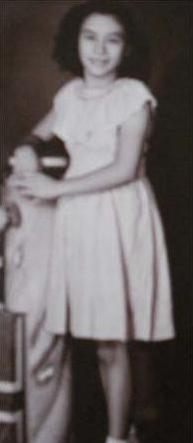 How old were your parents when they got married?
How old were your parents when they got married?
I'm not for sure how old they were, but I know they were young….really young…about 16-17 years old.
Were your parents ever inform you about sex education?
Yes, my mother had told us that we should have separate beds from our siblings once we reach a certain age. I was told that once I start my menstruation, I should be aware about boys because I might could get pregnant.
How did you wash clothes?
When I was young we didn't have our own water wheel pump…our neighbor had one in their yard so we often ask if we could use some of their water. Eventually we put up our own water wheel pump. I remembered... my arms getting tired from pumping the machine to wash our clothes. We used our bare hands to wash the clothes. My hands were usually sore by the time were done washing clothes. We used a metal string to air dry the clothes. It was the hardest task I ever had to do….especially that there were so many of us in the family. The girls were usually stuck with doing the laundries.
How did you cook your food without the advantage of electricity or gas?
We gathered woods and used it to build a fire to cook our food. The woods caused our pots to turn dark due to the smoke. Cooking was a task that I never complain about because it made me feel good to know that my the family have food to eat.
What types of food do you usually cook?
We usually cook a lot of vegetables, fish and rice. The vegetables were from our garden and the fish usually came from my dad fishing trip.....the rice we eat came from farming. Only on good days that we get to have meat…..it was expensive for us to eat meat. I remember always longing to have meat in our diet but our family just couldn't afford it.
Do you have any memories of the Great Depression?
Great Depression was a devastating part of history. In our village, people became more greedy. Many had prey on other peoples properties…….theft became an ongoing event at the time. Many would do everything to survive so they would do the things that were degrading to their soul. The Great Depression really not affected us as much because we live in a place where farming, fishing, and planting was the source of our income. We have our garden to provide us with vegetable and fishing was something we don't have to buy. Many people affected the most were the ones living in the city, where their food depends on their job working at the factories.
What were your memories of the Japanese invasion of the Philippines?
I remember when the Japanese came to the city, they killed someone at the market. Since then, the Japanese would go house to house and take everyone they encounter, but they were no one left in our village, so left our home and fine refuge in the woods. The Japanese would take mostly men. They would take everything from the carts, to livestock, and whatever they could fine in the houses. My brother was one that was taken by the Japanese troops. They were taken captivated for awhile without food, so were really starving. We were not informed as to where they were taking them. It was weeks before they release them. We were very scared of their fate. Our family was praying so much for the safe return of my brother. Our neighbor was also taken, he was very old and yet it didn't stop the Japanese from taking him too. My cousin who was being noisy was also taken when they saw him where he was hiding. Another neighbor pretended he needed to use the bathroom, so the Japanese had let him loss.
What events do you remember during the Japanese and the American presence in the Philippines?
I remember witnessing airplanes circulating the area and some dropping the bomb at the school. There were no casualties' because the school was closed. The Americans were very good to us. They camped in our backyards and were very nice to the people in the village. The Americans gave us hope. They share some of their food to us and some of their clothes. Our backyards became a place of entertainment and happiness. The Japanese have killed many people. Many people in Manila were the ones that suffered the most.
What can you say about war?
War is never good for anything because it hurt people, families, and it brings more suffering to the already suffering people. There is no need for anymore war. War is something that destroys properties that people work so hard to build.

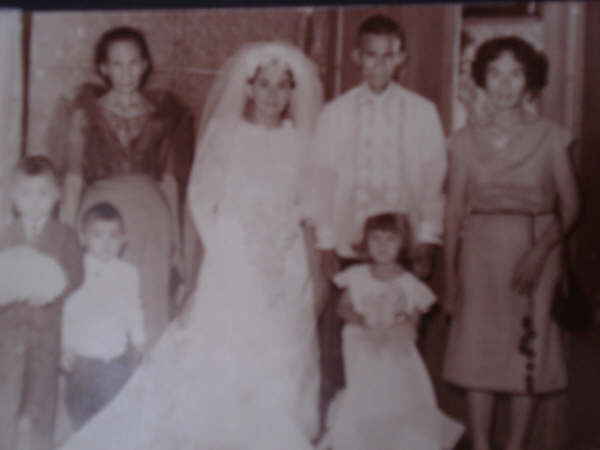
What types medicine were available back in your early years?
We bought some medicines for my father, but mostly were homemade remedies. We….ammm(teary eyes) couldn't afford nothing to help him…we were that poor.
How old were you when you started working?
I started working at a really young age….about 12 years old.
How safe was the workplace?
The workplace back then was not very safe. I worked at a beauty salon where there were no fire exits or fire distinguisher. The chemical we used for curling hairs has a really strong smell…..I imagine that couldn't be good.
What type of transportation do you have during your early years?
I remember riding a cart being pulled by a horse….that was the main transportation in our village. Tricycle was also use for transportation….tricycle was basically a motorcycle connected with a passenger sit with a third wheel. I believe jeepney was already available then…I'm not really sure. We tend to walk a lot back in the day..…it was cheaper.
What do the highways look like in your early years?
Back then when I started teaching, we couldn't even ride the jeepney because the roads were not build yet, so the only option we had was riding the cart that was being pulled by a horse. A thirty minute ride using the tricycle would have taken about two hours riding the cart. I used to wake up really early to go to work because of how long it takes to get to work.

How did you pay for your college?
I worked at the salon during the day and I went to school at night. It was a very difficult time of my life, but I knew that life could get more difficult without an education so I pursue my education with great conviction.
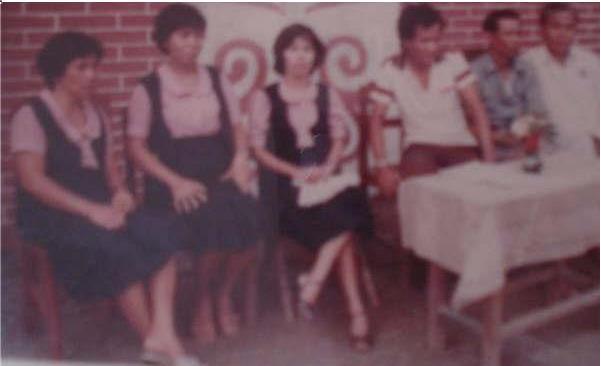
How hard was it to get a teaching job back then?
It was really difficult to get a teaching job because back then there were many people with education degrees but there were less jobs to fill. If you pass the board you might have a better chance of getting a teaching job. Even without the eligibility we could still get a job as a substitute teacher, but there were no guarantees of keeping the job.

When you got married, was it a fix marriage?
No it wasn't a fix marriage. I fell in love with my husband….and so as he. We dated only for a short time and then we got married.
Why divorce not legal in the Philippines?
I never heard of such a word "divorce". I believe the reason for not making divorce an option in the Philippines was because majority of the people in the Philippines were Roman Catholic. The relevance of religion played a great role in people's lives. It would be a disgrace to be single parent then....at least the community would think so. I don't think I would ever consider divorce if it was made legal otherwise…..my children were important that I would not take their father away from them. I suppose I would be willing to take that sacrifice to make the marriage work for the sake of my children.
Did you ever try homebirth?
No, I never tried giving birth at home. My husband felt really strongly about hospital birth. I guess we didn't want to take any risk. But I knew many of the neighbors who had tried homebirth…they did well. I don't see no harm on homebirth…I think it was a very brave thing to do.
When your husband lost his job, what did he do to support the family?
We decided to put our own handicraft business. It was physically draining....it was very exhausting work. We were up so late in the night to meet the deadline. We support our family that way.
Were your children also involve with the handicraft processing?
Yes, the children were great helpers. It was a duty that was given to them by choice. But if they wanted to go to college, they really didn't have a choice but help us. Well, they wanted to go to college so the only way to pay for their college was to help us with the business. It was a part of our lives that I was not so proud of for making them work, but I was left without a choice. I wanted to do the best we can for them, but we have to struggle as a family to survive. We did what we could to pay for their college so they wouldn't have to go through things I went through.

How did your father die?
We didn't really know the cause of his death…he was sick one day and he never really recovered from it. He was never taken to the hospital either. He was always concern about the fee for the hospital or doctor, so he never wanted to be taken to the hospital.
How did the passing of your father affected your life?
I was devastated when he died because he was the main provider of the family. We were always happy when he comes home from fishing because we knew we would have a good food to eat. Losing him was not as bad as I thought because my grown brother and sisters had taken over his main duties of fishing, farming, and planting. I really missed him because he was a great father. He never complained about being tired from working.
What was the cause of your husband's death?
My husband died of throat cancer…..( choking..speechless). He wanted to fight the cancer with the best he can but his body eventually give up. He was a good man…I miss him very much.
How was your husband's passing affected you financially?
Well, at the time of his passing, three of our children had already finished college and my other daughter already living in America….so I wasn't doing so bad. My children were providing me financial support and were very graceful about helping… so I'm very grateful.
Did you ever smoke?
Yes, only for a short time. I learned to smoke when I was taking care of my mother who was ill due to old age. Back then, we were not aware of diapers for elders, so I was constantly cleaning her…the urination and defecation became too much…the smell was really tough for me…..and because of that, I would often smoke when I wash her clothes to help disguise the odor. I eventually stop smoking after she died because I knew it was very addicting and very bad habit.
If you were given a choice, what were your dreams and your aspiration?
If I was given a choice, I would have gone to a better school…..the University of the Philippines. I would have like to have my own retail store. I would have travel more and see more of the world.
Why did you decide to move to America?
I decided to move here in America with my daughter because I was all alone living in the house. My husband died and it became more and more difficult to live in a house where we both used to live. My other children were living in Manila where they could only visit every so often. I came here to help my daughter take care of her children and support her while she finish school.
Did you find it hard to assimilate with people in America?
No, because people are very respective….for most that I met anyway. I find it comforting that America is a place of different diversity. It make a more appreciative to see people of different beliefs, cultures, and ethnicity.
What do you think of America?
America is a place of great things compared to the Philippines. There are many opportunities available here for people. America is a place where things are precisely done somewhat quickly, and place where technology play an important role in daily events.
What obstacles did you encounter when you moved to America?
The main obstacle I encountered when I moved to America was controlling my diet. I never dealt with high blood pressure until I moved here. I've never seen so much meat until I move to America. The language was also an obstacle when I first move here, but after awhile, I managed to apply myself so much better.
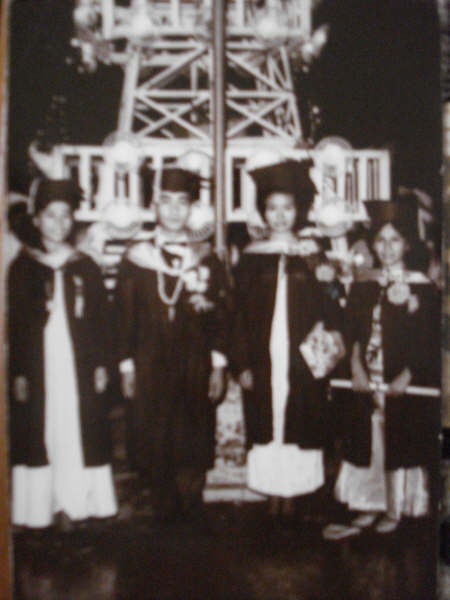
What else would you like to add?
I am very happy that my children were able to have a good career considering the obstacle we were faced in the past. Being poor is an opportunity to learn and to work hard…and not giving up on your dreams. Life can be so cruel at times but the cruelty can only get better if you find ways to surpass this phase and pursue a dream that will bring prosperity. Do not let life obstacles get on the way of your dreams, instead use it for your advantage and motivation to get ahead of life and make it better.
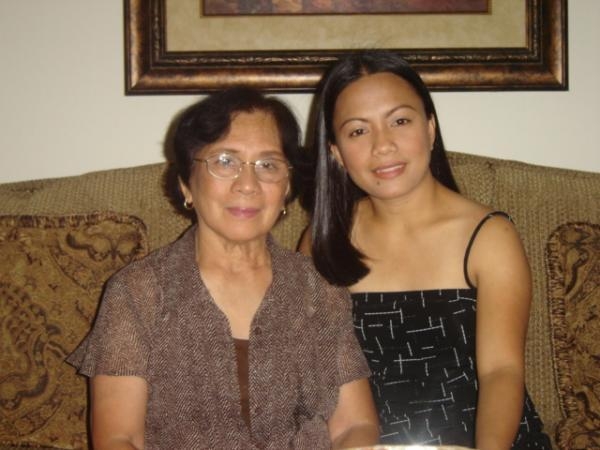
ANALYSIS
The oral history project had tremendously helped me learn so much about my mother's life journey as well as history itself. My view of the past history had seemingly changed since I participated on this oral history project. My perception was change by intriguing realities of actually learning part of history from a person who live through that era. Through this oral history project, I learned the most valuable lesson, that is, to never turn your back from the past and from where you came from, I learned about the Japanese invasion in the Philippines, the great depression, and life in general during that particular era. I learned the humility to appreciate simple things in life and find joy to the things I have. She taught me endurance and skills to survive in an era when life could be so fragile. In this interview, the most points made were mostly positive. The stories were related in a very intense and emotional manifestation, however, the subject always tend to point out the positive part of the story and lessons to learn. She point out the importance of family cooperation as valuable part of survival. The slight drawback on this interview was my mother's personification of Japanese troops as murderers. She still carries a grudge against their part on capturing her brother. The most shocking discovery I learned during this interview was when my mother revealed that my uncle was taken away by the Japanese troops, and kept him for weeks at a camp, where the family had no access nor have any idea where it was located. This event was never spoken in the family. During this interview, photos of my mother and her family were used to verify the stories that were relayed to me. The benefits about learning the past through oral history process was actually documenting the interview and have compilation of her life journey. It provides a glimpse of the past and their drive to survive. The drawback was when she has to recollect the most painful part of her journey in life and share it with me. Overall, the oral history project is the effective way of learning the past because the stories came from a person who lived and experienced life through that part of era. My view on immigration had changed due to this interview in a way that people in America are now more accepting to people from different ethnicity. I am glad that my mother had migrated in America when immigration laws were so much better compared to what it used to be.
TIMELINE
- Lucia Cristobal Visperas was born on Sept. 14, 1933 in San Carlos City Pangasinan, Philippines, to her parents Placido Cristobal and Candida Cristobal.
- March 1949, Lucia graduated high school at Speaker Eugenio Perez National Agricultural School.
- 1950, Lucia moved to Manila and worked for her cousin's grocery store.
- 1951, Lucia moved back to San Carlos City Pangasinan and work for a Hair and Beauty Salon.
- 1961, Lucia started taking college courses in the afternoon while working in the morning to support her and pay for college.
- 1967, Lucia met her husband Severino Visperas.
- 1967 Lucia received her bachelors' degree in elementary education At San Carlos College.
- June 18, 1967, Lucia Visperas married Severino Visperas.
- July 1967, Lucia and her husband Severino Visperas moved to Manila.
- During the years of 1968, 1969, and 1971 Lucia Visperas gave birth to her three oldest children.
- 1972, Lucia and her family moved back to San Carlos City, Pangasinan and lived with her aging parents.
- May 15, 1972 Lucia's father, Placido Cristobal, passed away of unknown cause.
- 1974, Lucia gave birth to her youngest daughter.
- 1981 Lucia accepted a teaching job at the Central I district in San Carlos City Pangasinan.
- 1982 Lucia worked for another school district in suburb area of Gamata.
- 1984 Lucia lost her job because she had not obtained eligibility for the job.
- During 1984-1986, Lucia spent most of her days taking care of her ailing mother.
- February 1987, Lucia's mother had passed away due to old age.
- In 1988, Lucia and her husband Severino Visperas started a business producing ropes and handicraft business for import-export.
- By 1993, three of Lucia's children graduated from college and her youngest daughter, Mylene Funderburk, migrated to the United States.
- In 1997, Lucia's husband lost her battle with throat cancer.
- In 2002, Lucia moved to Germany and became her daughter's dependent.
- In June 2005, Lucia once again moved and accompanied her daughter, Mylene, to San Antonio, Texas.
- Interview by Mylene Funderburk on September 11, 2008.
ANNOTATED BIBLIOGRAPHY
http://geology.com/world/philippines-map.gif. Map. Lucia Visperas was born in the country of the Philippines. This web link will give you a geographical map of the Philippines.
The site is being maintained by weBAd. San Carlos College, Founded in 1946, San Carlos City Pangasinan. http://sancarloscollege.edu.ph/history.html. San Carlos College was the school Lucia Visperas attained her Bachelor's Degree in Education. Many of her great memories were connected to this school. In this web link, you will find the official web site of San Carlos College. The web link will provide a history of when San Carlos College was founded.
Ericta, Carmelita. Pangasinan, The Most Populated Province In The Philippines. 
